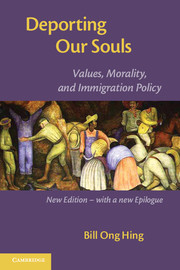Book contents
- Frontmatter
- Contents
- Foreword by Senator Edward M. Kennedy
- Acknowledgments
- DEPORTING OUR SOULS
- Introduction: Hysteria and Shame
- 1 Illegal Immigration: Give Them a Parade
- 2 Deporting Our Souls
- 3 Promoting Family Values and Immigration
- 4 Misusing Immigration Policies in the Name of Homeland Security
- 5 A Welcome Wagon for New Americans
- Epilogue: A Policy of Humanity
- Index
4 - Misusing Immigration Policies in the Name of Homeland Security
Published online by Cambridge University Press: 18 August 2009
- Frontmatter
- Contents
- Foreword by Senator Edward M. Kennedy
- Acknowledgments
- DEPORTING OUR SOULS
- Introduction: Hysteria and Shame
- 1 Illegal Immigration: Give Them a Parade
- 2 Deporting Our Souls
- 3 Promoting Family Values and Immigration
- 4 Misusing Immigration Policies in the Name of Homeland Security
- 5 A Welcome Wagon for New Americans
- Epilogue: A Policy of Humanity
- Index
Summary
Perhaps we should have expected a crackdown on noncitizens after 9/11. After all, the nineteen hijackers were foreigners who somehow made it into the country to commit evil. Implementing new procedures and reorganizing administrative institutions to ensure that all immigration visa processes and enforcement were screened through the lens of national security appeared to be in order.
And because the villains were adherents of Muslim extremism as advocated by Osama bin Laden, focusing the crackdown on Arab and Muslim noncitizens made sense – ethnic and religious profiling seemed to be acceptable.
But did these responses really make sense? Had the changes been in force prior to 9/11, would the profiling and immigration-specific modifications have prevented the attacks? What do we have to show for the changes that have been made? At what price has the new regime been implemented?
The answers may be frustrating. In fact, we would not have caught the hijackers if the new systems were in place prior to 9/11. There is little to show for the profiling that has occurred, and the country has paid a tremendous price in terms of civil liberties and relations with noncitizen communities – particularly Arab, Muslim, and South Asian communities. Profiling may make us feel more secure, but we are not. Actually we may be making matters worse. Any real advances in homeland security that have been made are due more to efforts in place before 9/11 coupled with greater cooperation between agencies and better policing practices than with crackdowns on noncitizens.
- Type
- Chapter
- Information
- Deporting our SoulsValues, Morality, and Immigration Policy, pp. 140 - 163Publisher: Cambridge University PressPrint publication year: 2006

